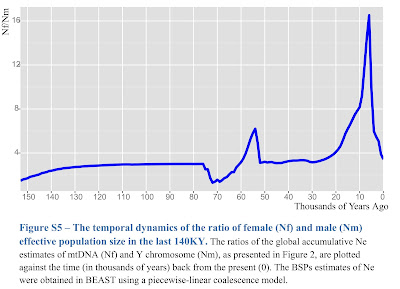Men: 100,000 Years of Uselessness

One of the books I've most enjoyed in the last 10 years was Hanna Rosin's The End of Men: and the Rise of Women . Despite its somewhat click-baity title (but hold muh beer, Hanna, and watch this!), TEOM wasn't an anti-male screed. In fact, I got the sense that Rosin was quite sympathetic to the men whose imminent demise she was predicting. The thesis of the book was that as manufacturing industry had declined, the traditional model of male breadwinner/female mom had disappeared. Women were now better than men at getting jobs in the new service/information economy, and while they were hard pressed to be both breadwinners and moms, they were surviving. Men, meanwhile, had been slow to adapt, refusing to take over part of the traditional female role while women were coopting theirs, and were mostly just 'going fishing'. And women, reasonably, were asking why they needed a full-time male, when they could always get one when needed. What's fascinating is that it ...

